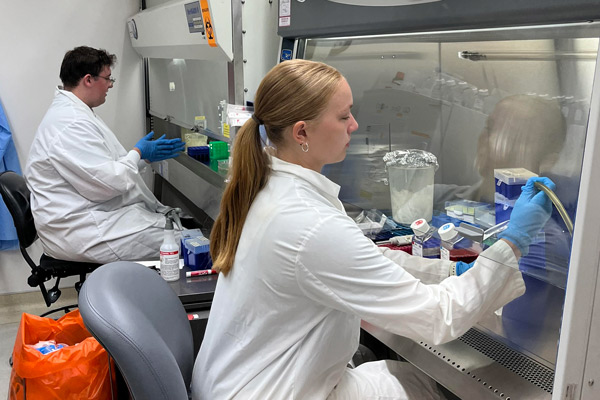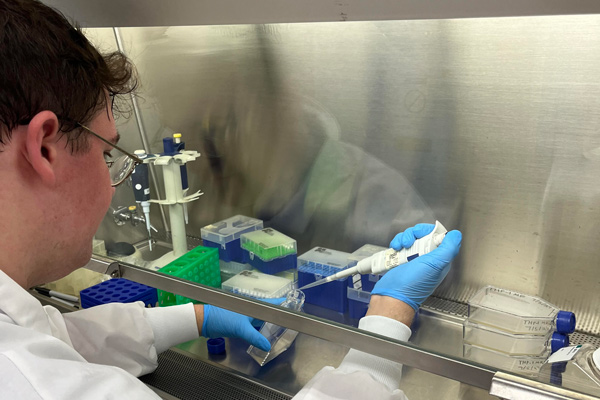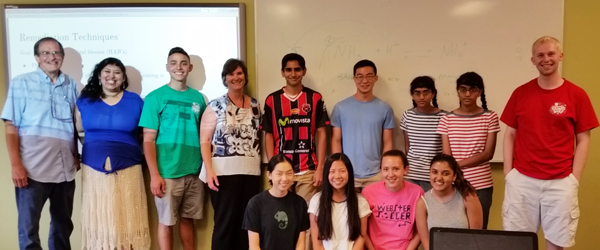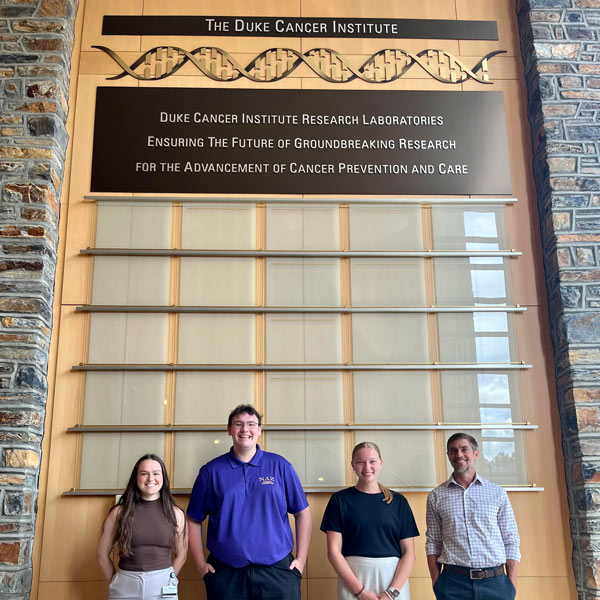Nazareth student research opportunity at Duke University expands in 2024
Naz alumni support learning and advancing cancer discoveries
Research on nanoplastics, forever chemicals, cancer cells, tissue regeneration, and therapy resistance by Nazareth University undergraduates at Duke University Cancer Institute helps advance scientific discoveries.
That opportunity for Naz students to work with Naz alum Jason Somarelli '02, Ph.D. at Duke expanded to include two students for summer 2024.
“They come in as research interns to take on independent research projects we have going in the lab, gain experience in a top research setting, and make progress toward new scientific discoveries,” Somarelli explains. “The Naz students are so motivated, optimistic, and grateful to be with us. They are also extremely hard-working and bright students who contribute meaningfully to our research.”

Nazareth students Matthew Roberson (from Syracuse, New York) and Kayleigh Ronas (from the Watertown, New York, area) conduct research as undergraduate scholars at Duke University Cancer Institute in summer 2024.
Nanoplastics and forever chemicals
In this centennial year (2024), expanded support from Paula Childs ’70, Ph.D. enabled two Naz students to intern at Somarelli’s lab:
- Matthew Roberson ’26 (toxicology and public health double major, honors minor) tested whether nanoplastics are capable of inducing inflammation. “This experience has profoundly enriched my perspective on my studies, he says. “I am thrilled to be fully integrated within the lab environment, engaging in discussions with individuals who are more advanced in their research careers.” He hopes to continue research on plastic additives and cancer and is interested in graduate study at Duke in toxicology and environmental health or exploring the intersection of public health, environmental sciences, law, and public policy.
- Kayleigh Ronas ’25 (biology and clinical laboratory sciences double major) worked on a project to understand the consequences of "forever chemicals" on our cells. “This research laboratory experience is invaluable as it not only allows me to learn numerous techniques essential for my future career but also offers a profound understanding of the life of a scientist in this professional setting,” she says. “Living in a new city and experiencing an educational environment outside of Nazareth has stretched my comfort zone and enabled personal growth.”
Where are they now?
Students who’ve completed the program have benefited from the experience.
- 2019: Lan Nguyen '20 (biomedical sciences) studied marine mammals to discover new therapies for overcoming hypoxia; she went on to medical school.
- 2020: Benjamin Butler ’21 (chemistry), worked on a bioinformatics technique to identify genes that are associated with therapy resistance (remotely due to the pandemic); he became a mechanical technician at Corning Inc.
- 2021: Elena Baugh ’23 (biology, psychology, French) participated in a class where she developed an independent project studying tissue regeneration in marine organisms as a way to identify new mechanisms for regeneration in humans; she went on to pursue a master’s in genetics, genomics, and bioinformatics at the University at Buffalo.
- 2022: Maggie Hoey ’22 (biology, pre-med) worked with prostate cancer cells to identify genes important for inducing hormone treatment resistance. In 2024, she returned to Duke to work in an adjacent lab as a research analyst and lab manager for a surgical oncologist, and she is preparing to apply for medical school. More details below.
- 2023: Joey Nettles '25 (biochemistry major) helped create a system to understand the cellular consequences of exposure to chemical additives found in plastics. He is a senior at Nazareth and plans to pursue a doctorate in chemistry.

Matthew Roberson works on testing whether nanoplastics are capable of inducing inflammation.

Paula Childs, standing fourth from left, with Naz faculty, students, and Rochester-area high school students conducting research in 2016.
Ongoing Naz connections
Maggie Hoey ’22 (biology, pre-med at Nazareth) — completed her internship at Duke in 2022. She was excited to return to Duke to dig into a new sector of cancer research, working for a surgical oncologist in a lab adjacent to Somarelli’s.
“My 2022 internship with Duke taught me about the power of research in improving the field of healthcare and especially oncology,” she says. “I am very grateful to have learned so many lab protocols and techniques and how the results of my work can be applied to help improve cancer treatments. It also taught me how to balance working on a diverse team of professionals.”
She plans to go on to medical school in 2025, to become an oncologist. “I have found oncology to be one of the specialties in medicine that is particularly tied to research, and that is something I believe I will always want in my life. Oncology also has some of the sweetest patients I've ever met, and some of the most interesting treatment regimens. It is a very holistic field to work in. You get to build long-term relationships with patients and often with their families, too. I find it very rewarding.”
Meanwhile, Child’s long-term support of Nazareth student research continues to fuel experiential learning and innovation.
Philanthropy lights the future
Childs makes the internships possible, covering student costs such as housing, living expenses, and travel.
She majored in chemistry at Nazareth and said she benefited greatly from a summer research opportunity after her junior year, supported by the National Science Foundation. Childs went on to a career in forensic toxicology, including roles as a vice president and lab director at Labcorp laboratory services company. In retirement, she continues to learn by reading toxicology journals and books — and she helps others learn by tutoring adults weekly who are working to earn their high school equivalency diploma.
She said her philanthropy is inspired by the phrase “light tomorrow with today,” attributed to poet Elizabeth Barrett Browning. Childs earlier contributed funds to support Nazareth summer research on campus that included fieldwork in the region. One project by Nazareth professors, students, and area high school students investigated causes and possible solutions to the pervasive algae problem in Lake Ontario.
Providing financial support for today’s students is a way to appreciate the great faculty and the learning that has benefited Childs, she said. She visits Duke each summer and enjoys the connections with Somarelli and current Naz students. She loves seeing their eyes light up as they talk about their research. “They realize there’s a huge world out there and they can influence it, even in a small way,” she said.
Said Somarelli: “It's all thanks to Paula and her late husband, Eric. They have been so generous in supporting these students, and we should all look up to these heroes in our midst. The world needs more Paulas!”

From left: Maggie Hoey ’22, Matthew Roberson ’26, Kayleigh Ronas ’25, and Jason Somarelli '02